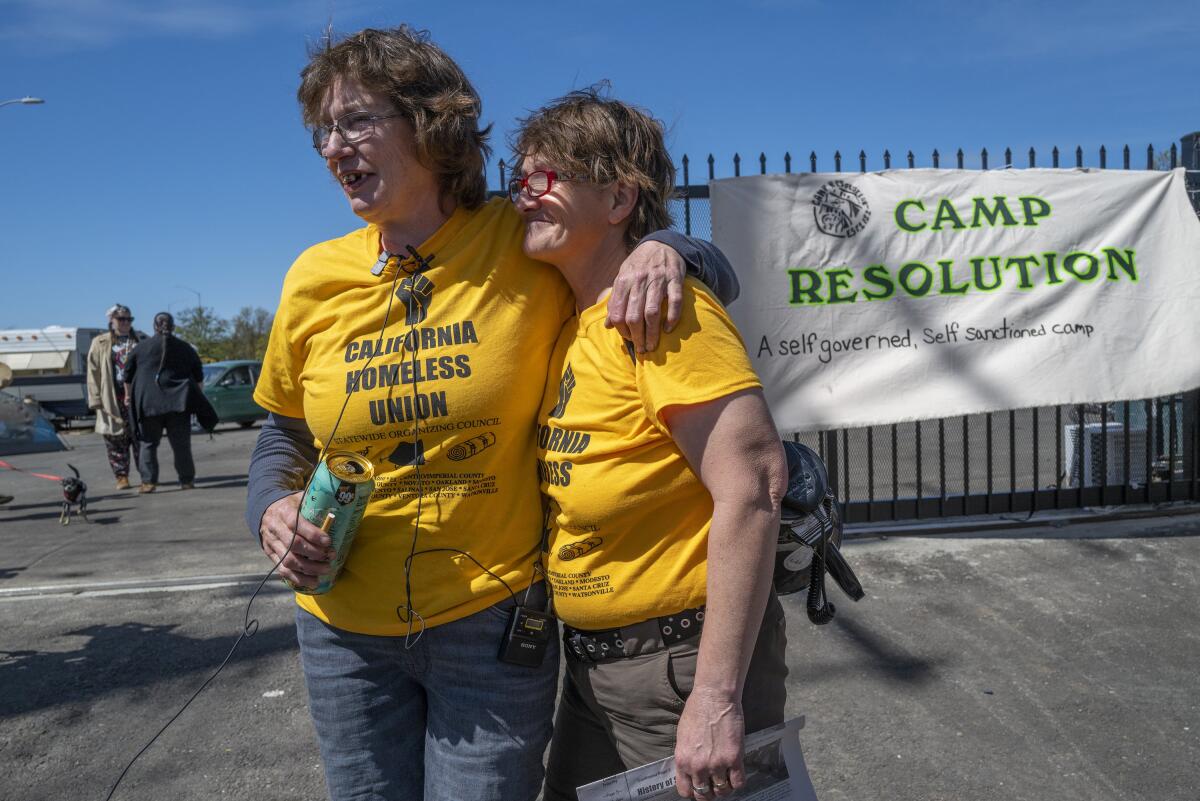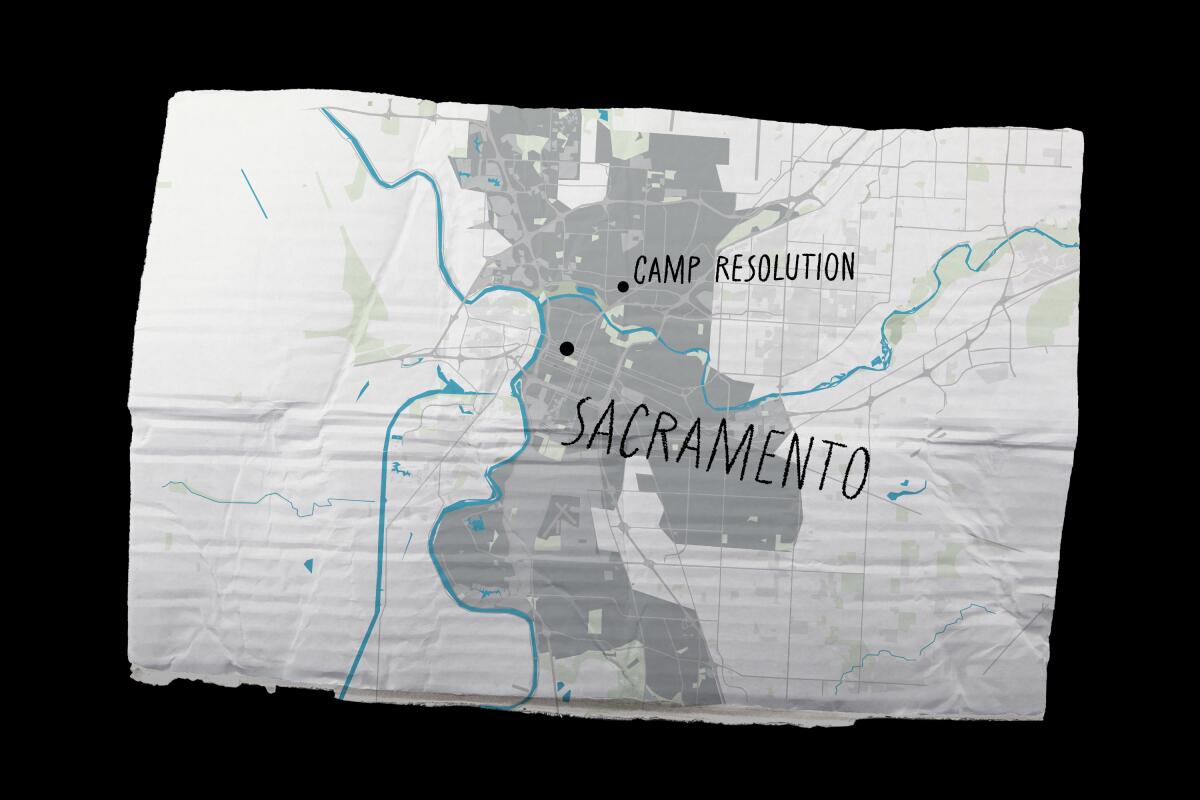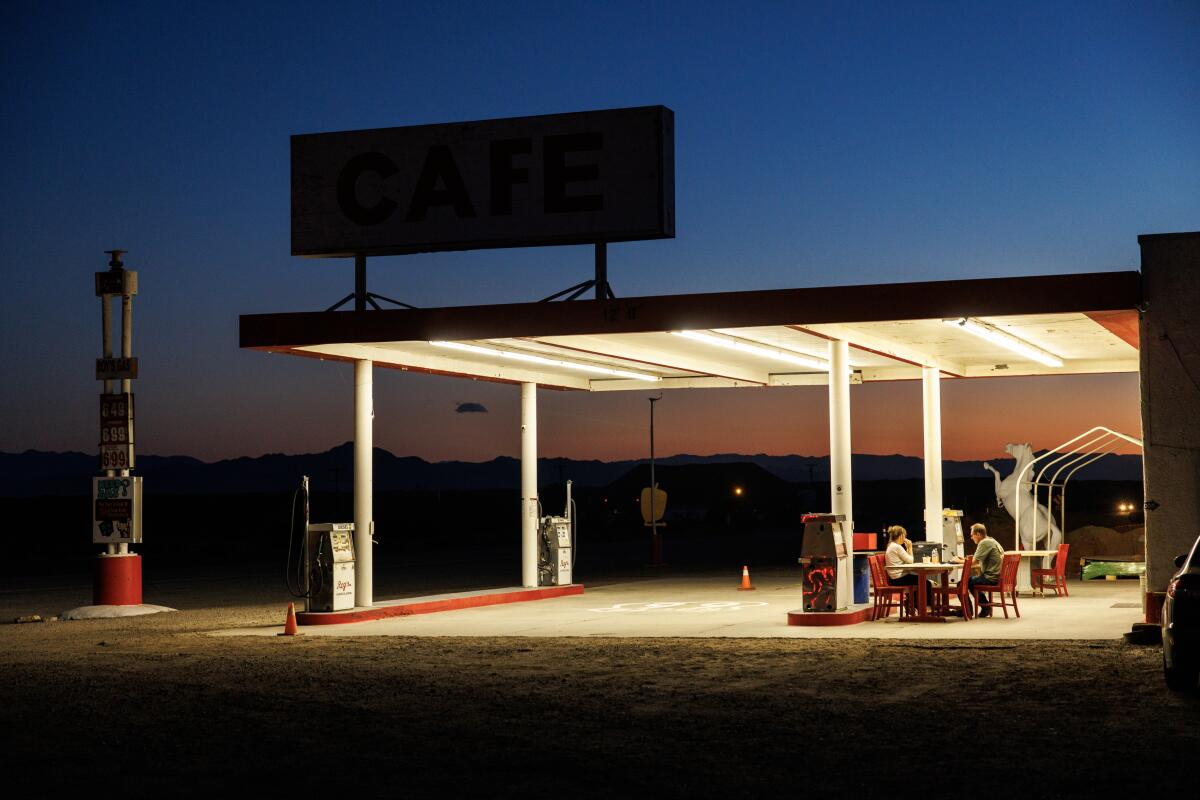Sacramento’s city-sanctioned homeless camp could be a national model. Instead, it’s a mess

Good morning. It’s Wednesday, June 12. Here’s what you need to know to start your day.
- Sacramento’s city-sanctioned homeless camp could have been a national model. Instead, it’s a mess.
- Hunter Biden is found guilty of three felony charges in gun case.
- How to get reservations for popular Lake Tahoe beach on busy days.
- And here’s today’s e-newspaper
You're reading the Essential California newsletter
Our reporters guide you through our biggest news, features and recommendations every morning
You may occasionally receive promotional content from the Los Angeles Times.
Sacramento sanctioned a self-governing homeless camp and agreed to find its residents permanent housing. How’d it get so messy?
An experiment underway in Sacramento that challenges how cities approach homeless encampments has become a cautionary tale.
A unique lease between a homelessness union representing an encampment on Colfax Street and the city states that city officials cannot close the self-governed Camp Resolution until every resident has been placed in “individual permanent durable housing.”
Advocates hoped the historic agreement could become a model for other cities.
Instead, they say Sacramento’s leaders are sabotaging the agreement and failing to deliver on their promise to house Camp Resolution’s roughly 50 residents, who are mostly women older than 40. The city has housed only two in over a year. Officials moved to close the camp in late March, as regular readers of this newsletter learned in April. Camp residents and their advocates vowed to fight back.
A couple of weeks later, homeless activists sued the city, accusing it of violating and undermining the lease.
After a long stalemate, the city rescinded its notice to terminate the lease on June 5, meaning the camp lives to fight another day.
Finger-pointing over a zoning variance
When Camp Resolution was first sanctioned, residents and activists breathed a sigh of relief. It meant no more encampment sweeps, and just about as much stability as you can get while living on the streets.
That relief depended on a zoning variance that allowed people to live on the site, a former maintenance yard.
The city applied for that variance, and the Central Valley Regional Water Quality Control Board granted it in January 2022, with an expiration date of June 1, 2024.
Just under a year after Camp Resolution’s lease took effect, the city stated in a letter that the camp’s lease would terminate because of the expiration of that zoning variance and ordered residents to vacate the site by May 16.
The city later said Safe Ground Sacramento failed to request the variance extension.
“The residents of Camp Resolution are facing a critical situation created by the actions — and the puzzling inaction — of the people who claim to be their advocates,” Sacramento City Atty. Susana Alcala Wood wrote in a statement last month.
Mark Merin, a local civil rights lawyer and chairman of the board for Safe Ground Sacramento, told me he tried to do just that, but the water control board said he needed authorization from the city.
“I asked if they would authorize me,” Merin said. “They said no.”
That changed after the Sacramento Homeless Union filed its lawsuit last month. Merin said he was granted authority by the city and requested an extension from the water board, which was quickly granted.
The city later rescinded its plan to close the camp. The extension expires Dec. 1.
Can the promise of Camp Resolution endure?

Camp Resolution’s residents still don’t have running water or electricity, which the city pins on Merin’s group for failing to facilitate.
Merin said Safe Ground Sacramento has tried to work with the city to get water and power flowing, but officials have refused to help.
He’s hopeful his organization can work with the city in the coming months to secure access to those necessities, and “negotiate some kind of orderly transition into housing.” He added that Safe Ground Sacramento has proposed building low-income housing on the site for camp residents.
“All we need to do is get a little bit of support from the city,” Merin said. “This is a demonstration project. It’s another way for cities to deal with the burgeoning homeless population without having to spend an arm and a leg to hire all kinds of people.”
City officials did not respond to questions about Merin’s version of events.
‘We don’t trust the city’
Not all the advocates are on the same page. Anthony Prince, lead counsel for the Sacramento Homeless Union, bristles at the idea that residents could temporarily relocate while housing is built on the site.
“We’ve learned the hard way that when the city says that they’re going to do something for people and it’s going to be temporary … all that ends up being is a voucher for a few weeks or being shoved into a shelter or maybe a waiting list for Section 8,” Prince said. “It might be legally classified as an offer of housing, but that’s not housing.”
The union is not dropping its lawsuit against the city either, Prince said, because the fate of the camp remains in jeopardy.
“We don’t trust the city,” he told me.
And there’s an additional concern: Triple-digit heat radiates off the pavement where residents live in vehicles and 17 city-provided trailers, which Prince said came without working air-conditioning. For him, city leaders’ dealings with Camp Resolution over the last year-plus reveals their hypocrisy.
“It’s so inconsistent for them to talk about how they’re worried about [residents’] health and safety and then they decline even to bring water,” he said. “We’re going to make the place habitable, but again, our commitment is not to have people there forever. It’s to use it as a staging ground for permanent housing.”
Today’s top stories

Hunter Biden
- Hunter Biden is found guilty of three felony charges in gun case.
- A hometown jury decides Hunter Biden’s fate: ‘It’s time to end this case.’
- Column: A jury was right to find Hunter Biden guilty. It’s the prosecutor who was wrong.
Rebecca Grossman trial
- Dead boys’ mother feels a ‘stab in the heart’ after Rebecca Grossman avoids toughest sentence.
- Rebecca Grossman gets 15 years to life for murder of boys killed in crosswalk.
Politics
- Biden vs. Trump: Where they stand on Israel, Palestinians, Middle East.
- MAGA figures say far-right wins in Europe are good news for Trump. Are they right?
- Billionaire-backed plan to erect a model California city qualifies for the ballot.
More big stories
- Why an Academy Museum exhibit came under fire for antisemitism: ‘It felt like a cheap shot.’
- Céline Dion demonstrates how stiff-person syndrome has affected her voice.
- 25 pro-Palestinian protesters have been arrested at UCLA, and ordered to stay away from campus.
- Two Pasadena doctors accused of overprescribing narcotics to patients, face Medical Board sanctions.
- Court says California regulation on Uber drivers is justified, but labor fight continues.
- This L.A. chef just won the James Beard award for Best Chef: California.
- Paramount Global sale collapses after Shari Redstone pulls support.
- USC’s graduate acting and dramatic writing programs are now tuition-free.
- A California beach is the nation’s most polluted, a study says. People are ‘getting sick left and right.’
- Antibiotics wreak havoc on the gut. Can we kill the bad bugs and spare the good ones?
- Dodgers’ Pride Night is back. Will there be protests after 2023 event honored drag nuns?
- The White House wants to remove medical debt from credit scores. Here’s why that’s a big deal.
Get unlimited access to the Los Angeles Times. Subscribe here.
Commentary and opinions
- Robin Abcarian: How a pious lifeguard made L.A.’s beaches an unlikely battlefield in the culture wars.
- Sammy Roth: Hillary Clinton wants more climate stories on Netflix.
- Bill Plaschke: Dan Hurley rejection is another humiliation for Lakers brand that has lost its luster.
- Michael Hiltzik: How a blunder by a respected medical journal is fueling an anti-vaccine lie.
- Anita Chabria: Biden bucks his party for an immigration win.
- Gustavo Arellano: ‘I’m going to keep succeeding’: Huntington Beach’s Latina MAGA mayor speaks.
- Jonah Goldberg: Immigration could get Trump elected again. Here’s how Democrats keep getting it wrong.
Today’s great reads

Inside L.A.’s oldest letterpress printer beloved by celebs, from Oprah to Jon Hamm. Surviving in an obsolete industry as long as Aardvark Letterpress has requires fundamental elements of entrepreneurship. Skill, dedication, creativity and professionalism are essential. General manager and co-owner Cary Ocon returns to another theme that’s kept what’s now the city’s oldest letterpress print shop running since 1968. “Dumb luck,” he says.
Other great reads
- ‘It’s always scary to jump into any role.’ 6 actors on bad scene partners and farting on cue.
How can we make this newsletter more useful? Send comments to [email protected].
For your downtime
Going out
- 👸🏾🐸 Tiana’s Bayou Adventure’s joyous debut proves it was time for stale Splash Mountain to go.
- 🌊 Popular Lake Tahoe beach will soon require reservations on busy days. Here’s how to get them.
- 🏕️ We recently featured nine of about 30 campgrounds we have to choose from in L.A. County. Now we want to hear from you. What’s your favorite L.A. campground?
Staying in
- 📖 It’s hard not to read a book on Bruce Willis’ legacy as a valediction of sorts, though it’s also a celebration.
- 📚De Los Reads: Here’s what we’re reading in June.
- 🧑🍳 Here are seven easy dessert recipes for pie, cake, clafoutis and more.
- ✏️ Get our free daily crossword puzzle, sudoku, word search and arcade games.
And finally ... a great photo
Show us your favorite place in California! We’re running low on submissions. Send us photos that scream California and we may feature them in an edition of Essential California.

Today’s great photo is from Times photographer Gina Ferazzi in Amboy, Calif., a Mojave Desert ghost town where an Americana icon fights to survive.
Have a great day, from the Essential California team
Ryan Fonseca, reporter
Kevinisha Walker, multiplatform editor and Saturday reporter
Karim Doumar, head of newsletters
Check our top stories, topics and the latest articles on latimes.com.
Sign up for Essential California
The most important California stories and recommendations in your inbox every morning.
You may occasionally receive promotional content from the Los Angeles Times.





